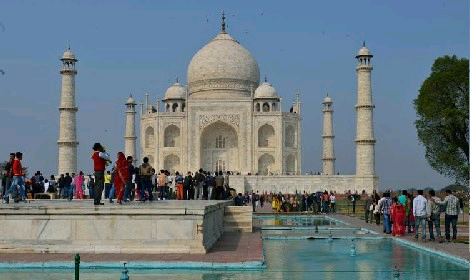QA:为什么韩国和日本这么繁荣,而历史上美国支持的南美政权却这么贫穷?(2)
正文翻译


评论翻译
Aaron Joseph Studied at University of California, Berkeley
They have vastly different birth control policies.
South American populations largely follow the Catholic faith, which is notoriously opposed to birth control of any kind. This has had a devastating effect on the economic growth of South American countries. It has also affected former Spanish colonies in places like the Philippines.
Consider that Venezuela, now essentially a basket case of a country, was once very wealthy. Many people blame the populist and socialist policies of Chavez for its fall. But it’s important to recognize how these philosophies could take root in the first place. These ideas tend to be more popular among the poor.
In 1960, Venezuela had a population of around 8 million. Recently it reached four times that amount of people. As you can imagine, to keep pace with growth like this, the country would need to be heavily engaged in building roads, schools, etc. That didn’t happen and the result was a poor, uneducated population ripe for takeover. All South American countries essentially suffered from this problem.
Contrast this with Japan and Korea. Japan’s population in 1960 was 92 million, while South Korea had 25 million. Today the numbers stand at 124 and 51 million respectively. This is a vastly different scenario which allowed Japanese and Korean parents to properly educate their children while also ensuring they were well-provided for.
【回答】就读于加州大学伯克利分校
它们的节育政策大相径庭。
南美洲人口大多信奉天主教,而天主教是出了名的反对任何形式的节育措施。这对南美国家的经济增长造成了破坏性影响。这也影响到菲律宾等前西班牙殖民地。
委内瑞拉现在基本上是一个濒临崩溃的国家,但它曾经非常富裕。许多人把委内瑞拉的衰落归咎于查韦斯的民粹主义和社会主义政策。但重要的是要认识到,这些理念最初是如何扎根的。这些理念往往更受穷人欢迎。
1960 年,委内瑞拉的人口约为 800 万。最近,委内瑞拉的人口达到了这个数字的四倍。可以想象,为了跟上这样的增长速度,国家需要大力修建道路、学校等。然而并没有这样做,结果是贫穷、未受过教育的人口成为了被接管的温床。所有南美国家基本上都存在这个问题。
这与日本和韩国形成鲜明对比。1960 年,日本人口为 9200 万,韩国人口为 2500 万。如今,这两个数字分别为 1.24 亿和 5100 万。南美国家与日本和韩国是完全不同的场景,日本和韩国的父母可以对子女进行适当的教育,同时还能确保子女衣食无忧。
Januck Jeong Lived in Korea over 30 years
As a Korean living in Korea, but having had spend my childhood growing up in Central and South America, I remember back in the days when we Koreans were critical of our countrymen in general. Some Westerns would think we hated our own. Some people did hate our own kind, I’m sure, but most of us were concerned about our future, and were humbled enough to criticize ourselves in front of the world. Some people on Quora will state it was the policies or political figures during the rapid growth period in Korea for obvious reasons. However, the underlying core couldn’t have been a sext few or a few policies to propel a country from one of the poorest in the world to this in 60–70 years. It was this humble attitude, and through the families that truly wanted a better future for their next generation that had fueled this growth, in the face of enough constant corruption and crime within the culture and the system that would make South America look saintly.
【回答】在韩国生活了 30 多年
作为一个生活在韩国,但童年是在中美洲和南美洲长大的韩国人,我记得当年我们韩国人对自己的同胞普遍持批评态度。一些西方人会认为我们讨厌自己的同胞。我确信,有些人确实讨厌我们自己的同胞,但我们大多数人都关心自己的未来,并谦虚到足以在全世界面前批评自己。在 Quora 上,有些人会说这是韩国快速发展时期的政策或政治人物造成的,原因显而易见。然而,在 60-70 年的时间里,把一个国家从世界上最贫穷的国家之一发展到今天,其根本核心不可能是少数几个人或几项政策。正是这种谦逊的态度,以及那些真正希望自己的下一代拥有更美好未来的家庭,推动了韩国的发展,尽管韩国的文化和制度中不断出现的腐败和犯罪现象足以让南美看起来很圣洁。
As far as I know, Central & South Americans lack this type of humbleness. In fact, Latin Americans are usually characterized as very proud peoples. Koreans too are proud, but at least in the 80s when I was there, I think Latin Americans were much more boastful with their futbol and their romantic colonial heritage. Obviously with all this, what they lacked was sobering humbleness.
Having humble citizens, is a simple but significant ingredient in nation building. I can easily assume that the Germans and the Japanese, having been embarrassingly defeated as “the enemy” against the Allied forces, have been very humbled after WW2. And these 2 countries experienced unprecedented growth as well.
We all know, many powerful nations were brought up from humble origins and humble beginnings, while their empires crumbled when it became full of itself. Yet, despite this knowledge we keep underestimating the humbleness factor and instead only rely on the “there was this political figure, and these policies, and this event, and..” type analogies (albeit, important factors).
Anyways, nowadays, Korea has this “we can do no wrong” attitude, which is alarming and sadly this isn’t coming from people who actually care about the people..
据我所知,中南美洲人缺乏这种谦逊。事实上,拉美人通常是非常骄傲的民族。韩国人也很骄傲,但至少在上世纪 80 年代我在韩国的时候,我认为拉美人更多地是在炫耀他们的五人制足球和浪漫的殖民遗产。显然,他们缺乏的是清醒的谦逊。
拥有谦逊的公民,是国家建设中一个简单而重要的因素。我可以很容易地假设,德国人和日本人作为 "敌人 "被盟军打败后,在二战后非常谦卑。而这两个国家也经历了前所未有的发展。
我们都知道,许多强大的国家都是出身卑微、起点低微,而他们的帝国却在自满之后轰然倒塌。然而,尽管我们知道这一点,我们却一直低估了谦逊的因素,而只是依赖于 "有这样一个政治人物,有这样一些政策,有这样一个事件,还有...... "这样的类比(尽管也是重要的因素)。
不管怎么说,如今韩国有一种 "我们不能做错事 "的态度,这种态度令人震惊,但可悲的是,这种态度并不是来自真正关心人民的人。
Daniel Anderson
Because there is a level of corruption and fraud in the banana republics the U.S. chooses to help that would leave Japanese and South Koreans aghast.
We support dictators in that part of the world as a continuing legacy of our Cold War days in trying to counter the Soviets, when we propped up people like Manuel Noriega and turned a blind eye to the systematic looting of his country’s treasury while he tortured and killed his political opponents (and anyone else who spoke out against him) because we felt we needed a counterweight to the Soviets’ support of the Sandinistas in Nicaragua.
We have done this all over the world - see the Shah of Iran, Ferdinand Marcos in the Philippines, etc. - because we care more about extending and/or maintaining our political influence than we do about the ordinary citizens of the countries we “support”. Heck, following the Iranian Revolution in 1979, we cozied up to Saddam Hussein and encouraged his war with Iran, just because we needed to feel as though we remained relevant in the region.
【回答】
因为美国选择帮助的香蕉共和国的腐败和欺诈程度会让日本人和韩国人瞠目结舌。
当时我们扶持曼努埃尔-诺列加这样的人,对他有计划地掠夺国库的行为视而不见,而他却折磨和杀害他的政治对手(以及任何反对他的人),因为我们认为我们需要一个制衡力量来对抗苏联对尼加拉瓜桑地诺主义者的支持。
我们在世界各地都这么干过,比如伊朗国王、菲律宾的费迪南德-马科斯,等等。因为我们更关心的是扩大和/或保持我们的政治影响力,而不是我们 "支持 "的国家的普通公民。1979 年伊朗革命后,我们与萨达姆-侯赛因亲密无间,鼓励他与伊朗开战,就是因为我们需要感觉到我们在该地区仍然具有相关性。
Harry Roberts
because the US has engineered it to be that way.
Imagine a prosperous - and unified - South America. That would be considered a direct threat to the USA.
So we keep them fighting amongst themselves.
It’s really not that hard to figure out. It’s much like what Europe does with Africa.
【回答】
因为美国就是这样设计的。
试想一个繁荣统一的南美洲。这将被视为对美国的直接威胁。
所以我们让他们继续内斗。
其实这并不难理解。这很像欧洲对非洲的做法。
Diego Esperia Software Engineer (2001–present)
This question main focus appear to be on the fact that USA backed / helped South American economies in the same way they helped South Korea, Japan or, in the same line of reasoning, West Germany, leaving aside economic / political differences.
Then, it is important to remark that this IS NOT A FACT. It is VERY WRONG.
United States never backed south american economies in any way. USA should not be held as the main accountable factor for South American uneven results (although many political positions may argue for that, see Open Veins of Latin America - Wikipedia
, from my perspective a pathetic cry-baby book written by a man that, at the time at least, did not understand world politics at all).
【回答】软件工程师(2001 年-至今)
这个问题的焦点似乎是美国支持/帮助南美经济的事实,就像他们帮助韩国、日本或西德一样,抛开经济/政治分歧不谈。
那么,必须指出的是,这不是事实。这是非常错误的。
美国从未以任何方式支持南美经济。美国不应该成为南美经济发展不平衡的主要责任因素(尽管许多政治立场可能会这样认为,见《拉丁美洲开放的矿脉》。在我看来,这是一本可悲的哭诉书,作者至少在当时根本不了解世界政治)。
However, the USA has actively worked to back their own interests in South American countries, and most of the time USA own interests collided with possible economic prosperity in the region. Their contribution has been definitely negative in terms of economic development and political stability (just for a taste, see 1973 Chilean coup d'état - Wikipedia
, both coups were publicly backed by the USA, or United States involvement in regime change in Latin America - Wikipedia).
On the other side, South Korea, Japan and West Germany were borders to adversary political powers with a different economic or political system. It made sense to invest and show off the power of full fledged capitalism; that resulted in political stability and economic development in line with USA main interests.
然而,美国一直积极支持自己在南美国家的利益,在大多数情况下,美国自身的利益与该地区可能出现的经济繁荣相冲突。就经济发展和政治稳定而言,美国的贡献无疑是负面的(参见 1973 年智利政变-维基百科,这两场政变都得到了美国的公开支持,或者说美国参与了拉丁美洲的政权更迭)。
另一方面,韩国、日本和西德与政治敌对势力接壤,有着不同的经济或政治制度。投资并展示成熟资本主义的力量是合理的,这将带来符合美国主要利益的政治稳定和经济发展。
Nf Lives in Seoul
Actually if you live here, you will see that it’s not that prosperous. It’s so focused on money making, that average life quality of the people is quite low. Let me explain.
There are two ways that economy can grow. One is if they can produce goods in a more cost effective ways than the competitors. Second is if they have better technologies.
Because Koreans work twice as hard than rest of the world, it’s very easy for it’s companies to produce goods in a cost effective ways. You might argue that there are cheaper places in the world to produce like India. But the fact is that those poor countries don’t have capital to buy technologies from advanced nations. So it means that companies are competing with other companies with same capital level.
【回答】居住在首尔
事实上,如果你住在这里,就会发现这里并不那么繁荣。这里太注重赚钱了,人们的平均生活质量相当低。让我来解释一下。
经济增长有两种途径。一是如果它们能以比竞争对手更具成本效益的方式生产商品。二是拥有更好的技术。
由于韩国人的工作强度是世界上其他国家的两倍,因此韩国公司很容易以低成本的方式生产商品。你可能会说,世界上还有像印度这样生产成本更低的地方。但事实上,这些穷国没有资金从发达国家购买技术。因此,这意味着企业要与其他资本水平相同的企业竞争。
Even though Korea can produce high tech goods, if you look close, most of the technologies are bought from outside. For example, Android phone, OS is developed by google. For the chips, the semiconductor producing machines is produced in the Netherlands by company called ASML. So it’s quite possible to produce most cutting edge, high-end products even if you don’t own any technologies.
Many people misunderstand it, and think that Korea is very advanced tech-savvy nation, but they don’t own much technologies. It’s these not very advanced companies like Samsung who don’t have technologies that are doing mass production. For companies who are doing mass production, they need to do a lot of marketing to sell stuffs to the masses. The companies who own the actual technologies don’t need to do marketing to the masses because they only sell their product to big corporations. That’s why many people don’t know about these tech-savvy companies very well, instead think mass producing companies are tech-savvy.
尽管韩国可以生产高科技产品,但如果你仔细观察,大部分技术都是从国外购买的。例如,安卓手机的操作系统是由谷歌开发的。至于芯片,半导体生产设备是由荷兰的 ASML 公司生产的。因此,即使你不拥有任何技术,也完全有可能生产出最前沿的高端产品。
很多人误解了这一点,认为韩国是非常先进的科技国家,但其实他们并没有拥有多少技术。正是像三星这样没有技术的不太先进的公司在进行大规模生产。对于进行大规模生产的公司来说,他们需要做大量的营销工作,才能把产品卖给大众。而拥有实际技术的公司则不需要向大众进行营销,因为他们只把产品卖给大公司。这就是为什么很多人并不了解这些精通技术的公司,反而认为大规模生产的公司才是精通技术的公司。
When the population works twice as hard as it’s competitors, it’s not really possible to not make money. And it’s for the top rulers not the people. And the news is controlled by the elites who are at the top. So that’s why news about Korea is most times rosy.
Korea has the highest rate of suicide among OECD countries. It has the lowest fertility rate. There are many important aspects that you overlook if you just look at the numbers like GDP. The infrastructure in Korea is pretty bad if you go into the alleys, it’s because good amount of tax money is going back to Chaebols as subsidies instead of it’s people.
当民众的工作强度是竞争对手的两倍时,不赚钱是不可能的。这是为最高统治者而非人民服务的。新闻是由高层精英控制。因此,关于韩国的新闻大多数时候都是乐观的。
在经合组织国家中,韩国的自杀率最高。韩国的生育率最低。如果只看 GDP 等数字,你会忽略很多重要方面。如果你走进小巷,韩国的基础设施是相当糟糕的,这是因为大量的税款作为补贴返还给了财阀,而不是人民。
Aaron Joseph Studied at University of California, Berkeley
They have vastly different birth control policies.
South American populations largely follow the Catholic faith, which is notoriously opposed to birth control of any kind. This has had a devastating effect on the economic growth of South American countries. It has also affected former Spanish colonies in places like the Philippines.
Consider that Venezuela, now essentially a basket case of a country, was once very wealthy. Many people blame the populist and socialist policies of Chavez for its fall. But it’s important to recognize how these philosophies could take root in the first place. These ideas tend to be more popular among the poor.
In 1960, Venezuela had a population of around 8 million. Recently it reached four times that amount of people. As you can imagine, to keep pace with growth like this, the country would need to be heavily engaged in building roads, schools, etc. That didn’t happen and the result was a poor, uneducated population ripe for takeover. All South American countries essentially suffered from this problem.
Contrast this with Japan and Korea. Japan’s population in 1960 was 92 million, while South Korea had 25 million. Today the numbers stand at 124 and 51 million respectively. This is a vastly different scenario which allowed Japanese and Korean parents to properly educate their children while also ensuring they were well-provided for.
【回答】就读于加州大学伯克利分校
它们的节育政策大相径庭。
南美洲人口大多信奉天主教,而天主教是出了名的反对任何形式的节育措施。这对南美国家的经济增长造成了破坏性影响。这也影响到菲律宾等前西班牙殖民地。
委内瑞拉现在基本上是一个濒临崩溃的国家,但它曾经非常富裕。许多人把委内瑞拉的衰落归咎于查韦斯的民粹主义和社会主义政策。但重要的是要认识到,这些理念最初是如何扎根的。这些理念往往更受穷人欢迎。
1960 年,委内瑞拉的人口约为 800 万。最近,委内瑞拉的人口达到了这个数字的四倍。可以想象,为了跟上这样的增长速度,国家需要大力修建道路、学校等。然而并没有这样做,结果是贫穷、未受过教育的人口成为了被接管的温床。所有南美国家基本上都存在这个问题。
这与日本和韩国形成鲜明对比。1960 年,日本人口为 9200 万,韩国人口为 2500 万。如今,这两个数字分别为 1.24 亿和 5100 万。南美国家与日本和韩国是完全不同的场景,日本和韩国的父母可以对子女进行适当的教育,同时还能确保子女衣食无忧。
Januck Jeong Lived in Korea over 30 years
As a Korean living in Korea, but having had spend my childhood growing up in Central and South America, I remember back in the days when we Koreans were critical of our countrymen in general. Some Westerns would think we hated our own. Some people did hate our own kind, I’m sure, but most of us were concerned about our future, and were humbled enough to criticize ourselves in front of the world. Some people on Quora will state it was the policies or political figures during the rapid growth period in Korea for obvious reasons. However, the underlying core couldn’t have been a sext few or a few policies to propel a country from one of the poorest in the world to this in 60–70 years. It was this humble attitude, and through the families that truly wanted a better future for their next generation that had fueled this growth, in the face of enough constant corruption and crime within the culture and the system that would make South America look saintly.
【回答】在韩国生活了 30 多年
作为一个生活在韩国,但童年是在中美洲和南美洲长大的韩国人,我记得当年我们韩国人对自己的同胞普遍持批评态度。一些西方人会认为我们讨厌自己的同胞。我确信,有些人确实讨厌我们自己的同胞,但我们大多数人都关心自己的未来,并谦虚到足以在全世界面前批评自己。在 Quora 上,有些人会说这是韩国快速发展时期的政策或政治人物造成的,原因显而易见。然而,在 60-70 年的时间里,把一个国家从世界上最贫穷的国家之一发展到今天,其根本核心不可能是少数几个人或几项政策。正是这种谦逊的态度,以及那些真正希望自己的下一代拥有更美好未来的家庭,推动了韩国的发展,尽管韩国的文化和制度中不断出现的腐败和犯罪现象足以让南美看起来很圣洁。
As far as I know, Central & South Americans lack this type of humbleness. In fact, Latin Americans are usually characterized as very proud peoples. Koreans too are proud, but at least in the 80s when I was there, I think Latin Americans were much more boastful with their futbol and their romantic colonial heritage. Obviously with all this, what they lacked was sobering humbleness.
Having humble citizens, is a simple but significant ingredient in nation building. I can easily assume that the Germans and the Japanese, having been embarrassingly defeated as “the enemy” against the Allied forces, have been very humbled after WW2. And these 2 countries experienced unprecedented growth as well.
We all know, many powerful nations were brought up from humble origins and humble beginnings, while their empires crumbled when it became full of itself. Yet, despite this knowledge we keep underestimating the humbleness factor and instead only rely on the “there was this political figure, and these policies, and this event, and..” type analogies (albeit, important factors).
Anyways, nowadays, Korea has this “we can do no wrong” attitude, which is alarming and sadly this isn’t coming from people who actually care about the people..
据我所知,中南美洲人缺乏这种谦逊。事实上,拉美人通常是非常骄傲的民族。韩国人也很骄傲,但至少在上世纪 80 年代我在韩国的时候,我认为拉美人更多地是在炫耀他们的五人制足球和浪漫的殖民遗产。显然,他们缺乏的是清醒的谦逊。
拥有谦逊的公民,是国家建设中一个简单而重要的因素。我可以很容易地假设,德国人和日本人作为 "敌人 "被盟军打败后,在二战后非常谦卑。而这两个国家也经历了前所未有的发展。
我们都知道,许多强大的国家都是出身卑微、起点低微,而他们的帝国却在自满之后轰然倒塌。然而,尽管我们知道这一点,我们却一直低估了谦逊的因素,而只是依赖于 "有这样一个政治人物,有这样一些政策,有这样一个事件,还有...... "这样的类比(尽管也是重要的因素)。
不管怎么说,如今韩国有一种 "我们不能做错事 "的态度,这种态度令人震惊,但可悲的是,这种态度并不是来自真正关心人民的人。
Daniel Anderson
Because there is a level of corruption and fraud in the banana republics the U.S. chooses to help that would leave Japanese and South Koreans aghast.
We support dictators in that part of the world as a continuing legacy of our Cold War days in trying to counter the Soviets, when we propped up people like Manuel Noriega and turned a blind eye to the systematic looting of his country’s treasury while he tortured and killed his political opponents (and anyone else who spoke out against him) because we felt we needed a counterweight to the Soviets’ support of the Sandinistas in Nicaragua.
We have done this all over the world - see the Shah of Iran, Ferdinand Marcos in the Philippines, etc. - because we care more about extending and/or maintaining our political influence than we do about the ordinary citizens of the countries we “support”. Heck, following the Iranian Revolution in 1979, we cozied up to Saddam Hussein and encouraged his war with Iran, just because we needed to feel as though we remained relevant in the region.
【回答】
因为美国选择帮助的香蕉共和国的腐败和欺诈程度会让日本人和韩国人瞠目结舌。
当时我们扶持曼努埃尔-诺列加这样的人,对他有计划地掠夺国库的行为视而不见,而他却折磨和杀害他的政治对手(以及任何反对他的人),因为我们认为我们需要一个制衡力量来对抗苏联对尼加拉瓜桑地诺主义者的支持。
我们在世界各地都这么干过,比如伊朗国王、菲律宾的费迪南德-马科斯,等等。因为我们更关心的是扩大和/或保持我们的政治影响力,而不是我们 "支持 "的国家的普通公民。1979 年伊朗革命后,我们与萨达姆-侯赛因亲密无间,鼓励他与伊朗开战,就是因为我们需要感觉到我们在该地区仍然具有相关性。
Harry Roberts
because the US has engineered it to be that way.
Imagine a prosperous - and unified - South America. That would be considered a direct threat to the USA.
So we keep them fighting amongst themselves.
It’s really not that hard to figure out. It’s much like what Europe does with Africa.
【回答】
因为美国就是这样设计的。
试想一个繁荣统一的南美洲。这将被视为对美国的直接威胁。
所以我们让他们继续内斗。
其实这并不难理解。这很像欧洲对非洲的做法。
Diego Esperia Software Engineer (2001–present)
This question main focus appear to be on the fact that USA backed / helped South American economies in the same way they helped South Korea, Japan or, in the same line of reasoning, West Germany, leaving aside economic / political differences.
Then, it is important to remark that this IS NOT A FACT. It is VERY WRONG.
United States never backed south american economies in any way. USA should not be held as the main accountable factor for South American uneven results (although many political positions may argue for that, see Open Veins of Latin America - Wikipedia
, from my perspective a pathetic cry-baby book written by a man that, at the time at least, did not understand world politics at all).
【回答】软件工程师(2001 年-至今)
这个问题的焦点似乎是美国支持/帮助南美经济的事实,就像他们帮助韩国、日本或西德一样,抛开经济/政治分歧不谈。
那么,必须指出的是,这不是事实。这是非常错误的。
美国从未以任何方式支持南美经济。美国不应该成为南美经济发展不平衡的主要责任因素(尽管许多政治立场可能会这样认为,见《拉丁美洲开放的矿脉》。在我看来,这是一本可悲的哭诉书,作者至少在当时根本不了解世界政治)。
However, the USA has actively worked to back their own interests in South American countries, and most of the time USA own interests collided with possible economic prosperity in the region. Their contribution has been definitely negative in terms of economic development and political stability (just for a taste, see 1973 Chilean coup d'état - Wikipedia
, both coups were publicly backed by the USA, or United States involvement in regime change in Latin America - Wikipedia).
On the other side, South Korea, Japan and West Germany were borders to adversary political powers with a different economic or political system. It made sense to invest and show off the power of full fledged capitalism; that resulted in political stability and economic development in line with USA main interests.
然而,美国一直积极支持自己在南美国家的利益,在大多数情况下,美国自身的利益与该地区可能出现的经济繁荣相冲突。就经济发展和政治稳定而言,美国的贡献无疑是负面的(参见 1973 年智利政变-维基百科,这两场政变都得到了美国的公开支持,或者说美国参与了拉丁美洲的政权更迭)。
另一方面,韩国、日本和西德与政治敌对势力接壤,有着不同的经济或政治制度。投资并展示成熟资本主义的力量是合理的,这将带来符合美国主要利益的政治稳定和经济发展。
Nf Lives in Seoul
Actually if you live here, you will see that it’s not that prosperous. It’s so focused on money making, that average life quality of the people is quite low. Let me explain.
There are two ways that economy can grow. One is if they can produce goods in a more cost effective ways than the competitors. Second is if they have better technologies.
Because Koreans work twice as hard than rest of the world, it’s very easy for it’s companies to produce goods in a cost effective ways. You might argue that there are cheaper places in the world to produce like India. But the fact is that those poor countries don’t have capital to buy technologies from advanced nations. So it means that companies are competing with other companies with same capital level.
【回答】居住在首尔
事实上,如果你住在这里,就会发现这里并不那么繁荣。这里太注重赚钱了,人们的平均生活质量相当低。让我来解释一下。
经济增长有两种途径。一是如果它们能以比竞争对手更具成本效益的方式生产商品。二是拥有更好的技术。
由于韩国人的工作强度是世界上其他国家的两倍,因此韩国公司很容易以低成本的方式生产商品。你可能会说,世界上还有像印度这样生产成本更低的地方。但事实上,这些穷国没有资金从发达国家购买技术。因此,这意味着企业要与其他资本水平相同的企业竞争。
Even though Korea can produce high tech goods, if you look close, most of the technologies are bought from outside. For example, Android phone, OS is developed by google. For the chips, the semiconductor producing machines is produced in the Netherlands by company called ASML. So it’s quite possible to produce most cutting edge, high-end products even if you don’t own any technologies.
Many people misunderstand it, and think that Korea is very advanced tech-savvy nation, but they don’t own much technologies. It’s these not very advanced companies like Samsung who don’t have technologies that are doing mass production. For companies who are doing mass production, they need to do a lot of marketing to sell stuffs to the masses. The companies who own the actual technologies don’t need to do marketing to the masses because they only sell their product to big corporations. That’s why many people don’t know about these tech-savvy companies very well, instead think mass producing companies are tech-savvy.
尽管韩国可以生产高科技产品,但如果你仔细观察,大部分技术都是从国外购买的。例如,安卓手机的操作系统是由谷歌开发的。至于芯片,半导体生产设备是由荷兰的 ASML 公司生产的。因此,即使你不拥有任何技术,也完全有可能生产出最前沿的高端产品。
很多人误解了这一点,认为韩国是非常先进的科技国家,但其实他们并没有拥有多少技术。正是像三星这样没有技术的不太先进的公司在进行大规模生产。对于进行大规模生产的公司来说,他们需要做大量的营销工作,才能把产品卖给大众。而拥有实际技术的公司则不需要向大众进行营销,因为他们只把产品卖给大公司。这就是为什么很多人并不了解这些精通技术的公司,反而认为大规模生产的公司才是精通技术的公司。
When the population works twice as hard as it’s competitors, it’s not really possible to not make money. And it’s for the top rulers not the people. And the news is controlled by the elites who are at the top. So that’s why news about Korea is most times rosy.
Korea has the highest rate of suicide among OECD countries. It has the lowest fertility rate. There are many important aspects that you overlook if you just look at the numbers like GDP. The infrastructure in Korea is pretty bad if you go into the alleys, it’s because good amount of tax money is going back to Chaebols as subsidies instead of it’s people.
当民众的工作强度是竞争对手的两倍时,不赚钱是不可能的。这是为最高统治者而非人民服务的。新闻是由高层精英控制。因此,关于韩国的新闻大多数时候都是乐观的。
在经合组织国家中,韩国的自杀率最高。韩国的生育率最低。如果只看 GDP 等数字,你会忽略很多重要方面。如果你走进小巷,韩国的基础设施是相当糟糕的,这是因为大量的税款作为补贴返还给了财阀,而不是人民。










